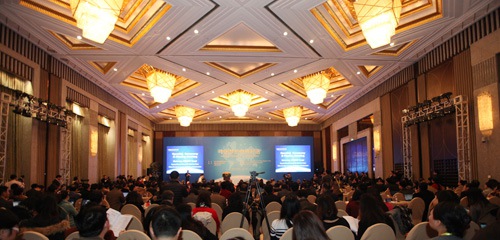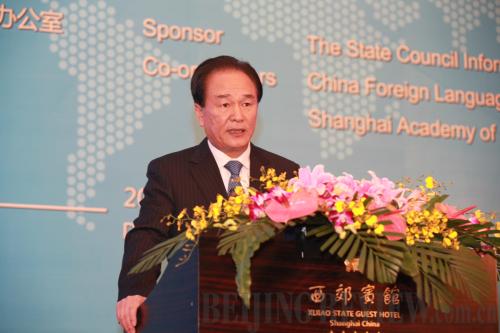|
 |
|
GATHERING OF MINDS: The International Dialogue on the Chinese Dream, which kicks off on December 7 in Shanghai, attracted nearly 100 participants from the government and academic circles (LI JIA) |
Mustafa Noyan Rona, a Turkish national who has lived in China for 30 years, realized all his dreams in China, which he says are no different from any other ordinary person's—going to a good university, gaining a master's degree and finding a good job.
Rona started learning the Chinese Mandarin in September 1978 when he enrolled at the Chinese Department of Ankara University in Turkey. In 1982, he graduated with exceptional grades and was selected to receive government-funded further education in China. He began studying history at Wuhan University in 1983 and received his master's degree there. Rona worked for the Turkish Embassy in China for many years after his graduation, and later became chief representative of the Shanghai Office of Turkish Garanti Bank in 1999.
"The Chinese dream is both a dream for the nation and individuals. For the country, the Chinese dream represents a strong desire for development, improvement, prosperity and peace; for individuals, the dream means happiness, health and maturity. It's the driving force for national development and individual pursuit of a better life," Rona told Beijing Review while discussing his understanding of the Chinese dream during the International Dialogue on the Chinese Dream held in Shanghai on December 7-8.
The seminar focused on the Chinese dream and its relationship to the Chinese road to international prosperity and peaceful development. Nearly 100 government officials, experts and scholars from China and abroad attended the event to discuss the connotations, significance and realization of the Chinese dream.
 |
|
SHARING WITH THE WORLD: Cai Mingzhao, Minister of the State Council Information Office, delivers a keynote speech on December 7 (YANG NAN) |
Cai Mingzhao, Minister of the State Council Information Office, delivered a keynote speech at the seminar, saying the Chinese dream has a strong appeal because it reflects the wishes of hundreds of millions of Chinese for a bright future.
"By putting forward the Chinese dream, President Xi Jinping has opened a new chapter for the Chinese and he has inspired the Chinese people to strive for a beautiful life and the renewal of the nation," Cai said.
Xi put forward, for the first time, the idea of the Chinese dream in November 2012, soon after the conclusion of the 18th National Congress of the Communist Party of China (CPC). It has since become a buzzword both at home and abroad.
"The Chinese dream has appeal because our people are confident that it can come true. People are confident in the Chinese dream because we have found the correct road to realize it. That road is socialism with Chinese characteristics. It is built on our experience accumulated in the three decades of the reform and opening-up, in the more than 60 years of consistent refinement after the founding of the People's Republic of China, in the more than 170 years since the Opium War in 1840, and in the 5,000-year-long history of the Chinese nation. This road is based on both historical factors and existing realities," Cai said.
"Along this road, we have implemented the reform and opening-up policy for 35 years. During this period, China's GDP has increased 142-fold and urban residents' income 71-fold. People's living standards have been drastically improved, and so has our national strength. Now, we are closer to our dream and goals than ever," he said.
Defining the dream
Xi elaborated on the Chinese dream in his speech at the closing ceremony of the First Session of the 12th National People's Congress in March 2013. Since then, he has talked about the concept on a number of occasions.
He stressed that the Chinese dream means the great rejuvenation of the Chinese nation. It embodies achieving prosperity for the country, the renewal of the nation and happiness for its citizens. Only when the country is doing well, can the nation and its people do well.
In essence, the Chinese dream is the dream of the people, Xi said. The Chinese dream is to let people enjoy a better education, more stable employment, higher incomes, better social security, better health care, improved housing conditions, and a better environment. It is to let our children grow up well, have satisfactory jobs and live better lives.
He also emphasized that the Chinese dream is a dream for peace, development, cooperation and mutual benefit for all. The Chinese dream will not only benefit the Chinese people, but also the people of all countries in the world.
| 